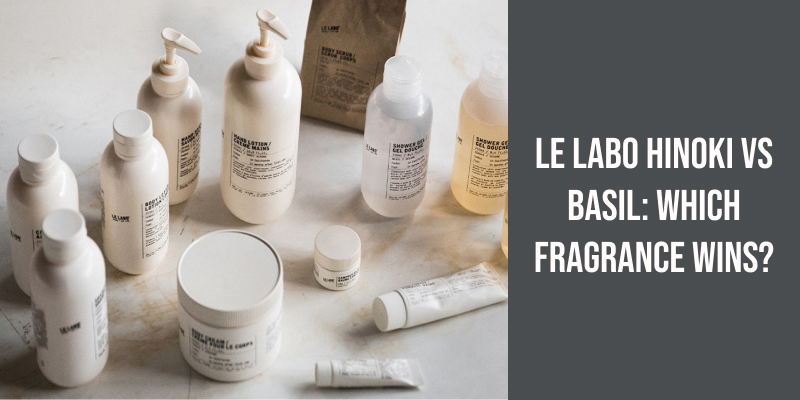When comparing Le Labo Hinoki versus Basil, both have unique characteristics, making them stand out. Le Labo Hinoki has a fresh, woody scent, themed around the Hinoki tree that grows in Japan, making it an excellent choice for lovers of earthy and natural fragrances. On the other hand, Le Labo Basil is known for its spicy, green, and sweet notes, creating a fresher and lighter scent compared to Hinoki, although not as woody. Choosing between the two boils down to personal preference whether one desires a more earthy and woody fragrance or a more refreshing and lighter scent.

Both scents have their unique characteristics and are part of Le Labo’s collection of artisanal and niche fragrances.
Here’s a comparison of Le Labo Hinoki and Basil:
Le Labo Hinoki:
Hinoki is a woody and aromatic fragrance that captures the essence of the Japanese cypress tree, also known as hinoki. The scent is inspired by the peaceful and meditative atmosphere of Japanese onsens (hot springs). The fragrance features notes of hinoki wood, cedar, incense, and white musk. It exudes a serene and contemplative vibe, with the woody and smoky elements taking center stage. Hinoki is a sophisticated and calming fragrance that evokes the tranquility of nature.
Le Labo Basil:
Basil is a fresh and herbaceous fragrance that celebrates the aromatic herb basil. The scent is lively and green, with a prominent basil note that is complemented by other herbal and citrus notes. Basil also includes notes of verbena, lime, and pepper, adding zest and vibrancy to the composition. The fragrance has a bright and uplifting character, making it a refreshing choice for warm weather or when you desire a burst of energizing green notes.
Comparison:
The main distinction between Le Labo Hinoki and Basil lies in their scent profiles and mood. Hinoki is a meditative and contemplative fragrance with woody and incense notes, evoking a sense of tranquility and serenity. On the other hand, Basil is a lively and vibrant fragrance with fresh, green, and herbaceous notes, offering a more invigorating and energetic experience.
Choosing between Hinoki and Basil depends on your personal preferences and the mood or ambiance you wish to create. If you enjoy woody and smoky scents that evoke a peaceful atmosphere, Hinoki may be the better fit. On the other hand, if you prefer bright and herbaceous fragrances that exude freshness and vitality, Basil might be the more suitable choice. As with any fragrance, it’s essential to try them on your skin to experience their full development and determine which one resonates best with you.
Does Le Labo Have Sulfates?
Le Labo is a high-end fragrance and beauty brand that’s known for it’s unique scents and luxurious products. Many people swear by Le Labos products, and for good reason. This means that many of their products are sulfate-free, which is great news for anyone who’s sensitive skin or hair.
Another popular option from Le Labo is their Conditioner. This product is specifically designed to provide deep hydration and nourishment to dry or damaged hair. It contains natural ingredients like avocado oil and shea butter, which help to repair and strengthen the hair from the inside out. Plus, like many of Le Labos products, it’s sulfate-free and gentle on even the most sensitive scalps.
Of course, like with any product, there are some potential downsides to using Le Labos hair care line. For one, their products can be quite expensive, which may not be feasible for everyones budget. Additionally, some people may not love the scents of certain products or may find that they don’t work as well for their hair type as they’d hoped.
Now that we’ve learned about the origin and properties of Hinoki wood and essential oil, you may be wondering whether Hinoki oil is the same as cypress oil. This is a common question among those interested in aromatherapy or using these oils for their health benefits. Let’s explore the answer in the following sections.
Is Hinoki Oil the Same as Cypress?
Cypress is another type of wood that’s often compared to Hinoki wood. However, despite their similarities, they aren’t the same thing. Cypress trees also tend to be taller and thinner than Hinoki trees, which are known for their wide trunks and thick foliage.
The Hinoki essential oil that’s obtained from the wood is known for it’s therapeutic properties. It’s often used in aromatherapy to promote relaxation and reduce stress levels. It’s also said to have antiseptic and anti-inflammatory properties, making it a popular choice for use in skincare products. Hinoki oil is also used as a natural deodorizer, as it’s unique scent can mask unpleasant odors.
One thing to note is that pure Hinoki oil can be quite expensive, as it’s a rare and highly sought-after ingredient. Some products on the market may claim to contain Hinoki oil, but it’s important to read the labels carefully to ensure that it isn’t a synthetic or diluted version of the oil.
Both are known for their durability and resistance to decay, making them popular choices for building and woodworking projects. They also both have a unique fragrance that’s used in aromatherapy and natural skincare products.
Cypress wood is found in many regions around the world and is also known for it’s durability and pleasant scent. While they aren’t the same thing, both substances are cherished for their unique properties and uses.
Conclusion
In conclusion, the debate between Le Labo Hinoki and Basil isn’t a matter of one being better than the other, but rather a matter of personal preference. Each fragrance has it’s unique qualities that appeal differently to every individual. The woody and earthy notes of Hinoki provide a calming and grounding experience, while the fresh and herbaceous scent of Basil brings to mind images of sun-soaked Mediterranean landscapes. Both fragrances are excellently crafted and offer a unique olfactory experience that resonates with different people. Ultimately, it all boils down to personal taste and what resonates with an individual’s unique senses. Choosing between Le Labo Hinoki and Basil is a matter of personal preference and the only way to find out which fragrance is better for you is to try them both and experience them firsthand.





